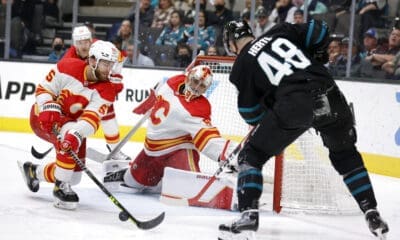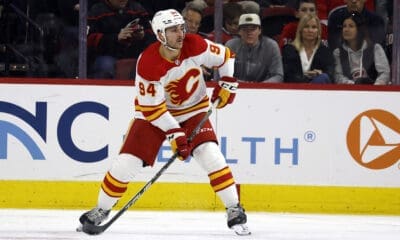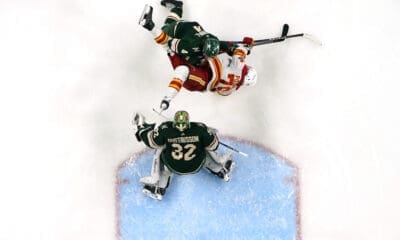Calgary Flames
Farm Review: T.J. Brodie

Since being selected by the Flames in the fourth round of the NHL Entry Draft in 2008, T.J. Brodie has emerged as the dark horse in the organization’s prospect stable. A defenceman who can skate and has enough offensive upside to quarterback a powerplay, Brodie is the first of his kind since Dion Phaneuf when it comes to Flames property (including the occasional defensive lapses).
Brodie was the Heat's lone representative at the AHL All-Star Game and was in and out of coach Jim Playfair's doghouse in his rookie season; Playfair experimented with different methods to get Brodie to focus more on the defensive side of his game such as switching his position from left to right defence, and said that Brodie seemed to have "leveled out" after a strong start to the season. The youngster was also called out by Flames AGM Jay Feaster for not "respecting" the level of competition in the AHL after getting cut from camp by the Flames.
Brodie played just three games with the Flames after making the club out of training camp in September, and with nearly a full season of AHL action under his belt, looks to be a safe bet to take on a full-time role with the club in 2011-12–especially with the contracts of defencemen Steve Staios, Anton Babchuk, Adam Pardy, Brendan Mikkelson, and Brett Carson potentially coming off the books this summer. In those three games with the Flames this past fall, Brodie had two PIMS and was a -3, playing upwards of 16 minutes in two of three games played and registering one shot on goal.
Brodie’s five goals and 29 assists in 68 games with the Heat this past season put him in a tie for second in scoring on a beleaguered Abbotsford team, and his 34 points put him 28th-best amongst AHL defenders and 32nd amongst rookies–nothing show-stopping to be sure. Of his 34 points, 18 came on the powerplay (2G, 16A), which means just over half of his offence came on special teams. By comparison, Jay Bouwmeester scored five times at EV, four times on the powerplay, and once shorthanded in what was essentially one full AHL season, making his output at evens versus special teams equal where goals are concerned, although T.J. had slightly more EV assists (18 vs. 16) while Bouw had no assists on special teams (Hockey Reference).
The jump from Junior to the AHL is a big one–perhaps bigger than the that from the AHL to the NHL–and it's rare that a player will coast through their first season in the minors without ups and downs of some sort. One knock on T.J. is that he has been injury prone and has rarely if ever played a full season at any level; his twelve-game absence last season was attributed to a suspension and an ankle injury which saw him miss the remainder of the regular season. But if he does make the team full time next season, his minutes will more than likely be few and against bottom-six competition, minimizing the wear and tear of 82 games.
by Hayley Mutch








